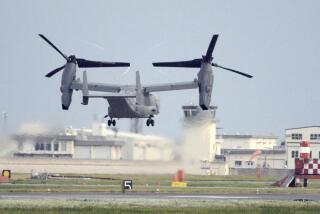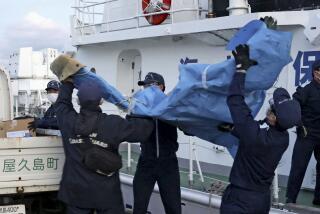Jack Broughton dies at 89; outspoken, revered Vietnam fighter pilot
As a combat pilot, Air Force Col. Jack Broughton was celebrated for bravery and tactical brilliance during the Korean and Vietnam wars. He received promotions and important assignments and seemed headed to become a general.
But a high-profile court-martial during the Vietnam War for allegedly violating the rules of engagement that ruled certain targets off limits ended his career.
After leaving the Air Force, Broughton was free to speak out about what he saw as the incompetence of President Lyndon Johnson and Defense Secretary Robert McNamara in micromanaging the war. Pilots couldn’t bomb an enemy outhouse without their approval, Broughton once complained.
Although grousing about restrictive rules of engagement and railing against politicians, bureaucrats and office-bound military brass is nothing new for front-line war fighters, few have done it as passionately or persuasively as Broughton. In the process he became a legend among fighter pilots, considered among the most individualistic of military personnel.
Broughton, who lived in Lake Forest, died Oct. 24 at Saddleback Memorial Medical Center in Laguna Hills. He was 89 and had entered the hospital two days earlier with variety of old-age ailments, according to his family.
In his 1988 book, “Going Downtown: The War Against Hanoi and Washington,” Broughton labeled Johnson and McNamara as “Washington weenies” and asserted that pilots and other aviators died because they were prohibited from hitting anti-aircraft emplacements and other “sanctuary” sites in North Vietnam.
The U.S. “lost a bunch of good people and good machinery all over Southeast Asia with their outhouse mentality on war,” Broughton wrote.
As years passed, Broughton refused to mellow. His anger against Johnson, McNamara and various others only increased as he blamed them for losing the Vietnam War.
“We were poorly utilized, we were hopelessly misdirected and restricted, and we were woefully misused by a chain of stagnant high-level civilian and military leadership that didn’t have the [courage] to fight the war that they ineptly micromanaged,” Broughton wrote in his 2007 memoir, “Rupert Red Two: A Fighter Pilot’s Life From Thunderbolts to Thunderchiefs.”
In a modern era where political and military objectives are intermixed, Broughton was “something of an anachronism. A swashbuckling skyjock of the old school, he wanted nothing more than to roll out his fighter jet every day and ‘go to work,’ ” David Gelman, who covered the Vietnam War for Newsday, wrote in his review of “Going Downtown.”
Jacksel Markham Broughton was born Jan. 4, 1925, in Utica, N.Y., and was captivated as a youth by tales of derring-do by military pilots. He attended West Point during World War II but did not graduate soon enough to fly in combat.
In Korea he flew 114 missions and deployed the experimental air-to-ground antitank rocket credited with protecting U.S. ground troops. After the war ended, he was assigned as an instructor and then as the commander of the Air Force aerobatic instructional team, the Thunderbirds, which prided itself on being the nation’s first supersonic aerobatic team.
In Vietnam he flew 102 missions and received an Air Force Cross and two Silver Star citations. The Air Force Cross (second only to the Medal of Honor for Air Force personnel) was bestowed for a mission over North Vietnam on Feb. 5, 1967, when Broughton was flying an F-105 Thunderchief.
“Despite serious aircraft malfunctions, marginal weather and grave damage to his aircraft from an exploding surface-to-air missile, he placed his armament directly on target, scattering fire and debris,” the citation read. “Disregarding the crippled condition of his aircraft, which minimized his chances for recovery to friendly territory, Col. Broughton then willfully acted as a decoy to divert hostile aircraft approaching the strike force.”
For all his bravery in the air, it was a mission Broughton did not fly that proved his undoing.
In June 1967, as the war intensified, a pilot under Broughton’s command told him that he may have fired at a Soviet freighter in the North Vietnamese port of Cam Pha while attacking an anti-aircraft site. The Soviet Union complained bitterly to Washington.
To protect his pilots from criticism by civilian and military officials far removed from the realities of the war, Broughton ordered the destruction of the gun-camera film so that no evidence could exist.
The pilot, his wingman and Broughton were faced with charges of violating a direct order not to fire on Soviet ships. One theory expressed by Broughton’s supporters is that the case was driven by animosity toward him by a ranking general.
“It seemed to be that the whole world was out of focus,” Broughton later wrote. “Old friends were turning against us and common sense was not to be found.”
As if to give the proceeding greater credibility, the convening authority placed Brig. Gen. Chuck Yeager in charge. Yeager was a friend of Broughton’s and shared his view that in war the object is to kill the enemy and damn the politics.
“He was saying, ‘Hey, you shoot at me, I’ll shoot back,’ ” Yeager told the Sacramento Bee earlier this year. “It really got out of hand, and they [the brass] wanted to court-martial old Jack and so they put me on as the head of the board. And I said, ‘This is stupid,’ so we excused him.”
The main charges against Broughton were dropped. He was convicted of destroying government property, fined $600 and given an admonishment. Upon appeal, the conviction was reversed and expunged from his record.
Despite his apparent victory, Broughton felt his career was ruined. He was assigned to a desk job at the Pentagon and retired in 1968. Soon he published “Thud Ridge.” The book “is packed with more suspense than any fiction thriller,” said a reviewer in the Los Angeles Times.
His three books are considered by many as the ultimate trilogy about the air war in Vietnam. “Thud Ridge,” which does not have the political tone of the other two, is often assigned reading for Air Force pilots in training.
In retirement, among other jobs, Broughton worked as a lead pilot for Puerto Rico-based Antilles Air Boats and then for Rockwell International, including work on safety measures for the B-1 bomber and the space shuttle Endeavour.
Broughton is survived by his wife, Alice Joy; daughters Sheila Broughton, Kathleen Schaefer and Maureen Broughton Murrah; son Mark Broughton; brother retired Air Force Col. Robert Nettles Broughton; and nine grandchildren. The family is arranging burial at Ft. Rosecrans National Cemetery in San Diego.
Twitter: @LATsandiego
More to Read
Start your day right
Sign up for Essential California for the L.A. Times biggest news, features and recommendations in your inbox six days a week.
You may occasionally receive promotional content from the Los Angeles Times.






